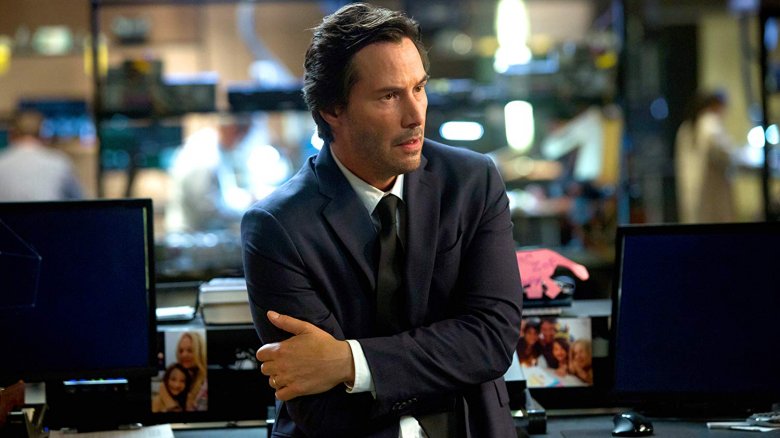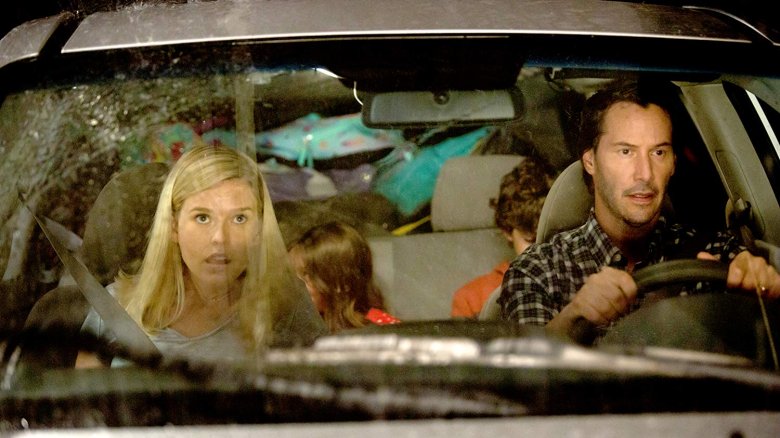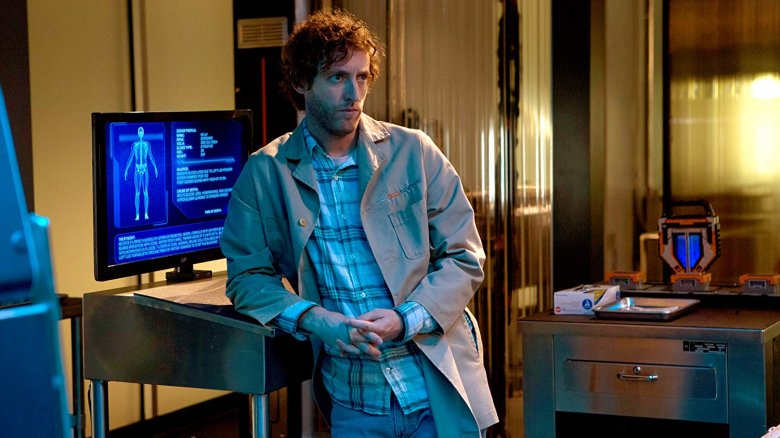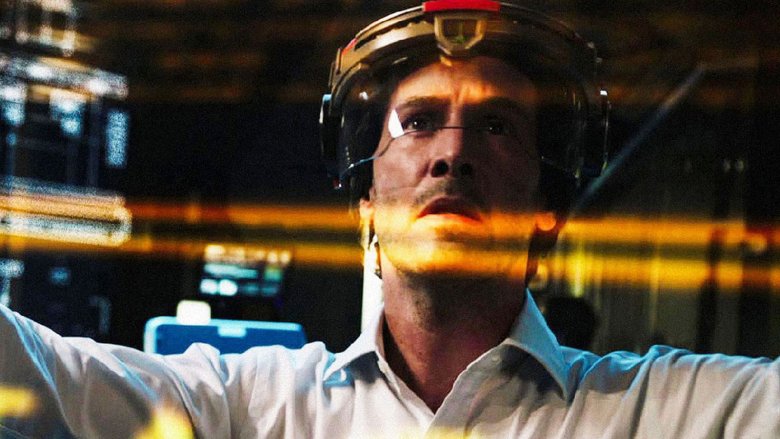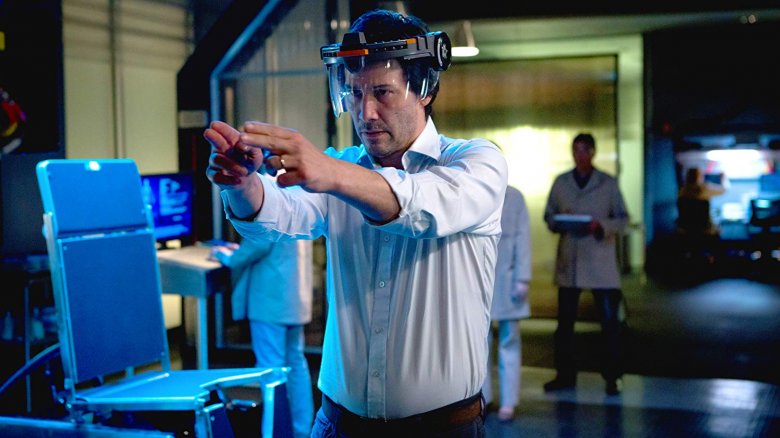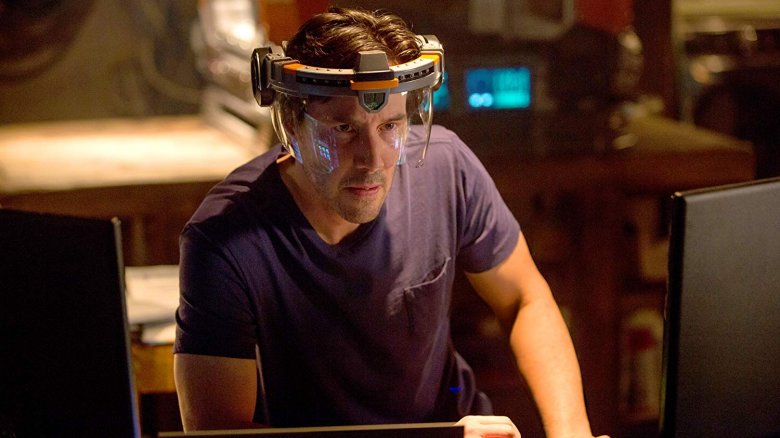Why Replicas Bombed At The Box Office
Replicas is one of the worst movies of 2019, and the year's just getting started. Poorly reviewed and little-seen, the bewildering sci-fi drama has already earned itself the distinction of being the worst-performing wide release of Keanu Reeves' career. It's enough to make you say "Whoa."
What does that performance look like, dollars-wise? The answer is a paltry $2.5 million across 2,329 theaters. Over the course of its opening weekend, Replicas came in 12th place at the box office, with its total take falling almost a million dollars behind the performance of Bohemian Rhapsody in its third month of release. On top of being a financial bomb, the movie was also hated by audiences, earning a C Cinemascore and a Metacritic average score of 17/100.
Replicas stars Keanu Reeves as William Foster, a brilliant neuroscientist who fights his peers, the police, and the limits of physical science to bring his wife and children back to life after a fatal car accident. Does it work? Well... sort of, but not really — and the same could be said for the movie itself. Read on to uncover why Replicas is the worst bomb of Keanu Reeves' career.
A worst for Reeves
Make no mistake — Replicas is not a movie being unfairly slept on by audiences. As its 10% aggregate score on Rotten Tomatoes indicates, it's a pretty terrible movie. It's bad enough to remind observers of Johnny Mnemonic, Reeves' 1995 work of critically reviled, financially disappointing sci-fi.
As an actor, Keanu Reeves has always been a versatile leading man. He's an actor who can credibly anchor action movies and romances, and thanks to the success of The Matrix, he's got established bona fides in the science fiction and fantasy genres, too. For a guy who's been critiqued at times for a certain characteristic flatness, Reeves deserves credit for being believable as both John Wick, a hyper-capable assassin, and Ted "Theodore" Logan, a spaced-out stoner in every manner, if not officially in deed.
Despite his distinctive talents, however, Reeves seems to have been sorely miscast in this sci-fi pastiche, asked to give a performance that requires more mania than his calm persona can carry. Several reviewers have aptly indicated this role would be better suited for Nicolas Cage, an actor who can truly sell crazy — and elevate B-movie nonsense through sheer charisma — in a way Reeves can't really match.
The opposite of hype
Replicas started filming at the tail end of the summer in 2016, a time period which feels worlds away from its release date over the second weekend of 2019. After years in the making, the movie arrived with little hype, fanfare, or even much in the way of morbid curiosity to accompany it. What happened?
There are many different reasons why a movie can end up with a big delay between principal photography and its distribution. But no matter what the specifics are, a long gap there is rarely an encouraging sign. The months and months in post-production can suggest a movie that's proving difficult to find and assemble in the edit, as Fox's twice-delayed X-Men spinoff The New Mutants has been rumored to be. Alternatively, it could be a movie that's so clearly damaged goods — so obviously bad — that producers have trouble finding anyone willing to take on the responsibility of releasing it, as in the example of Gotti, or many other, more forgettable movies.
In the case of Replicas, it's hard to tell which scenario is more accurate, though the movie's choppy storytelling and generally poor quality suggest a little of both. Either way, the movie wound up in theaters nationwide with practically no positive momentum behind it. If people heard any advance word about the movie at all, they probably weren't hearing anything good.
Selling schlock
Replicas was distributed by Entertainment Studios, a company which focuses on smaller releases. Owner Byron Allen has characterized the company as focusing on "studio crumbs," alternatively described as movies that, for whatever reason, "the studios don't want."
The company's track record includes such modest projects as Hostiles, Chappaquiddick, and 47 Meters Down — not necessarily bad movies, but not ones that set the world on fire, either. At worst, they're the kind of movies that you would expect to go direct to DVD or streaming platforms — and in the case of Replicas, that's probably what should have happened.
According to a report by Deadline, Entertainment Studios sank at least $10.5 million into TV ads for Replicas, and it appears to have all been money wasted. Instead of releasing the movie onto digital services to quietly fend for itself, the company tried to sell it as a theater-worthy experience with a wide release, seemingly only upping their financial risk in the process, and making the situation that much worse for themselves.
So bad it's baffling
Over the weekend of its debut, Replicas was already being heralded as a potential new entry in the "so bad, it's good" film canon, but it's hard to immediately determine if the movie really has that kind of appeal. True camp classics tend to be real knee-slappers, but Replicas is mostly confusing — disjointed, strange, and hard to follow, like the tail end of a weird dream, barely half-remembered.
There are a couple of small passages in the movie that tear through the noise and make an impression through pure emotional appeal. These rare moments are given considerable humanity by Reeves, who gives a commendable performance that can't help but feel informed by the actor's real-life tragedies. But his solid work can't carry the movie, which falls to pieces all around him like a collapsing house as it progresses toward its unsatisfying, patently absurd conclusion.
Replicas' badness doesn't come from the performances of its actors, which are fine enough, under the circumstances. The fault is with the script, the direction, and the edit, making the movie a bewildering watch that never builds momentum, raises no clear themes, and leaves you feeling like you must have missed something. The experience of watching it is like trying to follow a conversation when you're a little bit too drunk. You can... sort of understand what's going on, at least while it's happening, but when the morning rolls around, you're going to have a real hard time recalling any of the details.
Pirate gold
Replicas has been floating around the film industry, fully finished, since as early as 2017, when Entertainment Studios bought the North American distribution rights to the movie for $4 million at the Toronto International Film Festival. As a result, it's not surprising that digital copies of the movie have found their way online. At the time of this writing, if you want to see Replicas for yourself, you can easily do so without even getting up from your chair.
The possibility of online piracy hurting movie ticket sales has been a subject of spirited debate for years, the results of which are inconclusive at best. But it's certainly not great optics, or a good selling point, for a movie to have bootleg copies available on the internet when it needs all the help it can get at the box office. Should anyone want to see this movie, whether due to midnight-movie curiosity, or just because Keanu seems like such a nice person, they can do it on a whim without spending a dollar.
Winter blues
While Replicas certainly has its fair share of... unique problems, the movie also suffers from a problem that plagues every film that sees release during the beginning of a year. Speaking generally, people just don't see that many movies in January and February — and it's been that way for a long time.
After the turn of a new year, audience turnout is reliably depressed to a significant extent, with January generally being the worst month for movies at the box office. The effect is seriously drastic — according to The New York Times in 2013, movies released in December together gross an average of $1.2 billion, while the frigid month that follows only manages an immensely-smaller average of $387 million.
The reasons behind the slow month are fairly intuitive — if you're reading this in January, there's a good chance that you're feeling the effects right now. The weather tends to be bad, and the holiday season is always exhausting. January is a month when people slog back into their normal, workaday routines. If anyone's going to make time for a movie, it better be one that looks pretty good.
The dumping ground
The second part of Replicas' problem has to do with a sort of self-fulfilling prophecy. You see, movies released in January tend to have a certain reputation — they're really bad. As a result, more shrewd viewers know to be suspicious of any movie coming out around that time of year. Studios and distributors consistently hype up their movies when it comes to spring, summer, and holiday season releases, but in the dead month of January, it sometimes feels like they barely even try.
Another time of year when studios take out their trash is around the end of summer, after the Avengers and all their noisy friends have had their way with blockbuster audiences. Keanu Reeves' other recent movie as a leading man, a two-hander with Winona Ryder called Destination Wedding, also saw release during that fallow window, getting a limited run in theaters in August 2018. But while that acerbic, grown-up romance movie was divisive, it wasn't necessarily bad. Replicas, on the other hand, is so unlikable on nearly every level that it leaves you questioning the professional competence of the parties responsible.
Playing catch-up
While the numbers are always way smaller, people do still go out to the movies in January. That's how you can end up with modest hits like Escape Room, which make their money back and then some despite not being all that good. But for the most part, people spend the start of a year catching up on the best movies they missed from the last one, seeing them on the big screen while the opportunity is still available.
This trend is driven by the fact that lots of good movies tend to come out at the end of the year, whether they're big crowd-pleasers like Spider-Man: Into the Spider-Verse or offerings more small-scale and prestigious. The end of the year is crammed with movies to both take advantage of holiday audiences, like Star Wars does around Christmas time, and also in pursuit of awards attention. Fall and winter releases for the more Oscar bait-style movies help to ensure that they'll still be fresh in peoples' minds when voting for the BAFTAs, Golden Globes, and the Academy Awards start to rev up. "For your consideration," and all that. On the other side of things, the beginning of the year is where distributors stash movies that they'd prefer everyone forget, with the exception of the occasional Get Out-style runaway success.
A dystopian future
So, what are the long-term impacts of a disaster of this magnitude? Honestly, probably not that many. As big of a failure as Replicas is turning out to be, the expectations for the movie were never particularly high — in other words, this is probably low-stakes poker. The fact that the movie took so long to see release after filming was completed suggests that it had a reputation for being subpar well before critics and general audiences got a crack at it. Much like the story with Holmes and Watson, it doesn't seem likely that the people behind this were working with the belief that they had a great movie on their hands. (If they did, well, our sympathies... that opening weekend was probably a rough one.)
The only people who seem likely to suffer from the underperformance of Replicas are the people behind the cameras — the creatives who wrote such an incoherent script, brought it to life so blandly, and allowed the whole thing to be produced in the first place. In the wake of Replicas, those peoples' judgments are probably going to be a little more suspect. But for the actors above the line, like Keanu Reeves, who did the only decent work the movie can display? They'll most likely be fine. It's been so long since the actors filmed it, it's possible they've forgotten that this movie even exists — as almost everyone certainly will, by the time 2019 is over.

